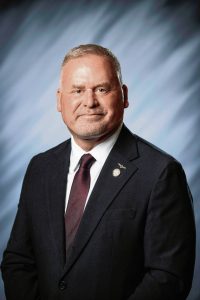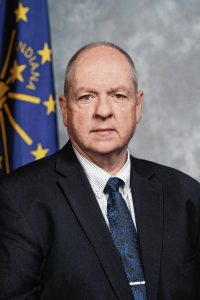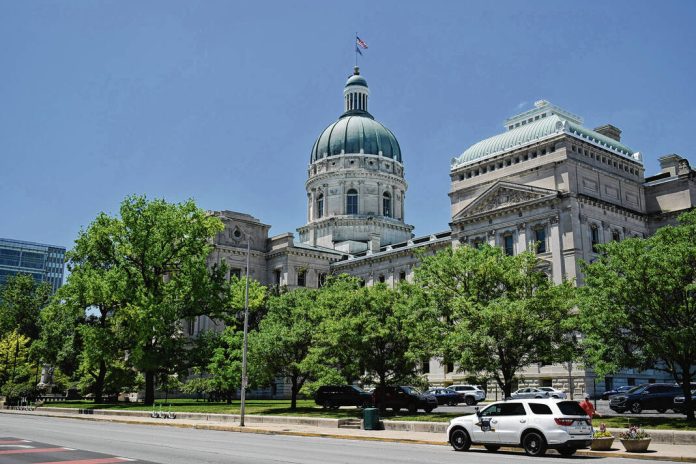Hundreds of bills have been filed for this year’s legislative session in Indianapolis.
Among those hundreds are more than a dozen authored by local lawmakers, and numerous others they have co-authored as well.
Here’s a look at some of the notable bills local lawmakers authored.
House Bill 1036: Age verification for material harmful to minors
HB 1036 would require adult-oriented websites with adult content, like pornography or other “material harmful to minors,” to use a “reasonable age verification method” to prevent minors from accessing their websites. It also creates a way for the parent or guardian of a child harmed by a violation of the age verification requirement to obtain monetary damages, injunctive relief and reasonable attorney’s fees, along with also allowing any other person to bring an action to obtain injunctive relief and reasonable attorney’s fees.
Additionally, the bill prohibits a person who conducts age verification from retaining the identifying information of an individual seeking to access adult-oriented websites and permits an individual whose identifying information is retained to bring an action to obtain monetary damages, injunctive relief and reasonable attorney’s fees.

The bill was authored by State Rep. Michelle Davis, R-Whiteland, and among the co-authors is Rep. Rob Greene, R-Shelbyville. It has been referred to the House Judiciary Committee.
Two similar bills have been proposed this session, HB 1296 and Senate Bill 17.
The American Civil Liberties Union has already expressed concerns about SB 17, saying it could subject Hoosiers to harmful surveillance and put their private information at risk, the Indiana Capital Chronicle reported.
House Bill 1104: School safety
HB 1104 would change Indiana law to allow school police officers the option to be on a 1977 pension plan, which gives death and disability benefits. It would also allow school corporations or charter schools that have eligible employees, whether that be school resource officers, or personnel from an outside agency, to be eligible for the fund.
It also says school safety plans must include an armed intruder drill protocol, and requires safe school committees to develop a policy that considers the effect of armed intruder drills on the safety and mental health of students, faculty, and staff. HB 1104 would prohibit an armed intruder drill that includes sensory components or activities requiring student participation or taking place during regular school hours if a majority of the student body is present on school property.
The bill was authored by Davis. Last week, she said the bill was made after discussions with school police departments, including Center Grove and Clark-Pleasant.
HB 1104 has been referred to the House Education Committee, where a hearing is set for 10:30 a.m. Wednesday.
House Bill 1154: Prohibition on taking of designated homestead
This bill would create a new “Hoosier Homestead Homestead Farm” program administered by the Indiana State Department of Agriculture and require an electronic registry of recognized properties. Eligible farms would have to be owned by the same family for at least 100 years.
Additionally, it provides that if a public project involves condemnation of a Hoosier Homestead Farm, the Indiana Land Resources Council must approve the condemnation before the condemner can take steps to acquire any other property for the project— with exceptions. It also requires a real estate sales disclosure form to indicate transfers of the farms and the familial relationships, if any, along with requiring the local assessor to forward the forms to the SIDA for use in updating the homestead farms registry.

HB 1154 was authored by Rep. Robb Greene, R-Shelbyville. It has been referred to the House Agriculture and Rural Development Committee, where a hearing has not yet been set.
House Bill 1156: Report on Medicaid behavior analysis services
HB 1156 would require the Office of the Secretary of Family and Social Services to prepare and submit a report to certain entities on the effects of Medicaid reimbursement changes to the applied behavior analysis services. This report would include: a summary of the changes made; the number of claims for Medicaid recipients of the services per month and throughout a Jan. 1, 2023, to Oct. 1, 2024, reporting period; the number of providers approved under Medicaid to provide the services; and more.
The report would be given to the Medicaid Oversight Committee, the legislative council, the Medicaid Advisory Committee, the Services for Individuals with Intellectual and Other Developmental Disabilities task force, the bill’s text shows.
Last year, the Family and Social Services Administration, or FSSA, proposed increasing the state’s Medicaid reimbursement rates for Applied Behavioral Analysis therapy to establish a uniform rate. The new rates went effect at the beginning of this month.
This bill was authored by Greene, who has been vocal about his concerns with the state’s changes. He had said they didn’t go far enough.
HB 1156 has been referred to the House Public Health Committee, where a hearing has not yet been set.
House Bill 1177: Limitations on interests of foreign countries
This bill prohibits governments from entering contracts with a “prohibited person” — a business, organization or citizen who is from, headquartered in, organized in/by or controlled by a foreign adversary, such as China, Iran, North Korea, Russia, countries designated as a threat to critical infrastructure by the governor or a foreign adversary listed under U.S. law. It also prohibits certain individuals and business entities from purchasing real property located within Indiana, authorizing the state attorney general to investigate violations.

Additionally, HB 1177 decreases the threshold for post-secondary educational institutions to report receiving foreign gifts to at least $50,000. Currently, it is set as the federal requirement of $250,000 or more.
HB 1177 was authored by Rep. Craig Haggard, R-Mooresville. It has been referred to the House Judiciary Committee, where a hearing has not yet been set.
House Bill 1178: Human trafficking awareness training
HB 1178 requires the owner or operator of motels/motels to provide human trafficking awareness training for employees, post human trafficking awareness signage and implement procedures for reporting suspected instances, along with creating a prevention policy. It also provides that an owner, operator or employee of an establishment that complies in good faith with the requirements is not liable for an act or omission related to human trafficking committed by a third party unless the owner, operator, or employee knowingly and willfully assists in the act.
In addition, it requires the Indiana Department of Homeland Security to make a publicly available list of approved human trafficking training courses. IDHS would also be required to maintain a list of establishments that are not in compliance with the new requirements.
The bill was authored by Haggard. It has been referred to the House Veterans Affairs and Public Safety Committee, where a hearing has not yet been set.
House Bill 1223: Penalties for drug dealing
HB 1223 would make dealing certain controlled substances a Level 2 felony if the use of the substance results in serious bodily injury, making it a sentencing enhancement. There is currently no enhancement for causing either serious or catastrophic bodily injury while dealing in any drug, though dealing in a controlled substance resulting in death is a Level 1 felony.
This bill also makes “certain collateral consequences,” such as licensure, forfeiture, racketeering or designation as a serious violent felon, for committing the offense the same as those for dealing in a controlled substance resulting in death.
The Indiana Legislative Services Agency was unable to estimate how many more offenders the enhancement would add to the Indiana Department of Correction’s offender population. However, between fiscal year 2020 and 2023, 33 people had been sentenced for dealing in a controlled substance resulting in death as a Level 1 felony, according to a fiscal impact statement.
The bill was authored by Haggard. It has been referred to the House Courts and Criminal Code Committee, where a hearing has not yet been set.

Senate Bill 170: Various elections matters
This bill would define “election worker,” and make it a Level 6 felony to take certain actions for the purpose of influencing an election worker; to obstruct or interfere with them; or injure them.
Additionally, it provides an exception to the requirement that certain electronic voting systems include a voter-verifiable paper audit trail, or VVPAT, if the voting system is being used to cast an absentee ballot with the absentee voter board.
SB 170 was authored by Sen. Greg Walker, R-Columbus. It has been referred to the Senate Elections Committee, where a hearing has not yet been set.

Senate Bill 190: Disaster relief fund
SB 190 would improve the accessibility of the state’s Disaster Relief Fund, while also upping the maximum amount of individual aid. It also enables governments to apply for funds proactively for the first time.
It was authored by Sen. Cyndi Carrasco, R-Indianapolis. The Daily Journal wrote about the bill last week.
The bill has been referred to the Senate Homeland Security and Transportation Committee, where a hearing has been set for 9 a.m. Tuesday.





